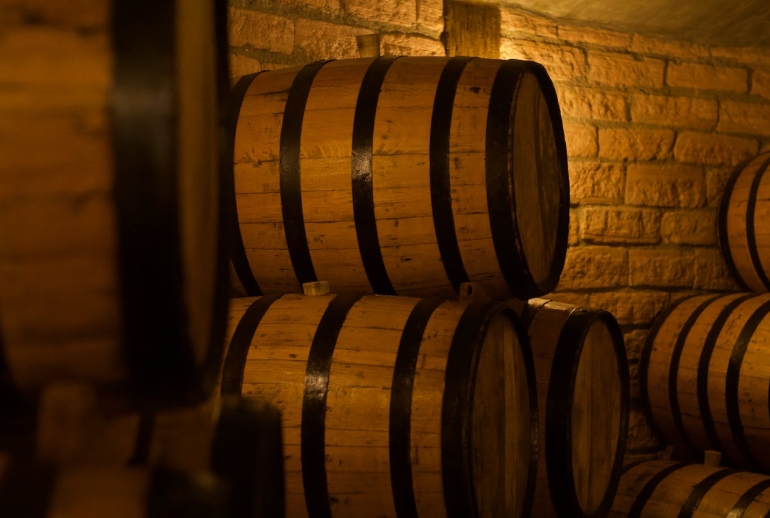This will date me, but one of my favorite songs in 1965 was by Herman’s Hermits from their self-titled album. That was the year this British group broke into the US market, outselling the Beatles. Three of the songs on the album, “Mrs. Brown You’ve Got a Lovely Daughter,” “I’m Henery VIII, I Am,” and “The End of the World” got a lot of radio play. I liked all three, but my favorite was “The End of the World,” a break-up song full of teen despair. I listened to it on my little battery powered transistor radio in the evening while studying and felt appropriately devastated.
Why does the sun go on shining?
Why does the sea rush to shore?
Don’t they know it’s the end of the world?
When you don’t love me anymore?
Why does my heart go on beating?
Why do these eyes of mine cry?
Don’t they know it’s the end of the world?
It ended when you said goodbye.
Such anguish, such grief, a soul torn apart—I felt the heartbreak, even though no one had so far broken mine. I was a believer: it was the end of the world.
A year or two later I was in college at the University of Minnesota, and to fulfill a math requirement took calculus. I knew I was in trouble when within 5 minutes of the first day I was lost. The professor talked fast and wrote even faster. The front of the classroom was covered by a long blackboard. He would enter the room, already lecturing, at the left side of the board. He wrote with his right hand and rubbed out the chalked equations with the eraser in his left. We scribbled notes as quickly as we could. I kept thinking that I could figure it out later, but never did. One day I realized I had passed the date on which I could drop the class without it affecting my grade. There was a quiz that day and I couldn’t solve a single equation. As I sat there staring at the quiz, I realized I didn’t actually care whether they could be solved, and that I could continue attending the class and fail, or simply not go back and fail. Having worked hard to become a perfectionist, it felt like the end of the world.
I realize this is simply a way of speaking, of expressing the pain and disappointment we feel at the moment. At times like this we need a friend to stand by us, not a scold that points out we are being overly dramatic. Still, neither high school breakups nor failing college calculus portend the end of the world.
In our politicized world, however, rhetoric tends to be shrill, debates sharp, emotions fraught, and in this setting how we speak of what’s coming in the future is significant for the people of God. This is part of Christian faithfulness and simply following the accepted norms of political debate in our fragmented world is insufficient.
We’ve all heard such predictions. If the wrong party or candidate wins or the wrong policy is instituted or legislation passed, awful things will occur, so awful it is fearful to imagine what life will be like for our grandchildren. The picture painted is dire, and those on both the Left and the Right depict their expectations in lurid colors. Columnist Ross Douthat notes that “if you switch back and forth between reading conservatives and liberals, you see mirror-image anxieties about authoritarianism and totalitarianism, which each side believes are developing across the partisan divide.” Each tend to speak as if it’s the end of the world.
I would suggest that people of hope should pause, take a step back and ask ourselves how we should speak in such a setting.
During an online conversation sponsored by The Trinity Forum, Luke Bretherton, author of Christ and the Common Life argued that Christians need to distinguish between the tragic and the apocalyptic. Every tragedy is tragic, but not every tragedy is the end of the world. It may feel like the end of the world, but it isn’t, and we should not imply that it is. Nothing is helped by failing to keep such things in proper perspective. And failing to distinguish the two serves to amplify fear, anxiety and outrage, and to decrease hope.
We have been given a vision of the Apocalypse in Holy Scripture, and it is a vision of hope, not dread. When we look to the future, we have reason not to fear but to be joyful. And what of the near future? In the near future we are called to trust, to be faithful in the ordinary and routine of our lives, regardless of whether that involves loss and suffering or gain and prosperity.
This means we have reason, because we are God’s people and he is our God, to lean against the fear and anger, meeting it with gratefulness and faith. It is possible, of course, that tragedy lies ahead. I hope not, but this is a fallen world and so tragedy, and suffering is possible. The tragedy I have heard predicted most often involves a loss of freedom from an unnecessary distortion of the American experiment that will cause us to suffer economic, political, religious and cultural loss. No matter how bad, this is tragedy, not the end of the world.
The Scriptures assure us that the people of God have suffered such loss before. In the sixth century BC, for example, the Hebrew prophet Jeremiah brought God’s word to God’s people as their world collapsed around them. Far to the north, Babylon had mustered its armies and would soon overwhelm Judah. False prophets assured the people that God would never abandon his people to a pagan nation, but soon the horrible reality of the truth of Jeremiah’s warnings began to sink in. The vision of what was coming was the destruction of all they held most dear as a nation. They would suffer, and the loss of their freedom would unravel the economic, social, religious and political realities that had formed their society. They had made bad choices and so would lose their freedom and suffer loss as a result (30:14-16). But God would remain faithful and so with the warning of judgment against national sin, God spoke hope and salvation to his people through his prophet (30:10-11).
And God’s grace goes even deeper. Even our suffering is not without purpose. The loss of freedom, if it comes, is a tragedy but it is neither random nor meaningless. It is always true that “the Lord disciplines the one he loves” (Hebrews 12:6, see 3-17). If tragedy comes, don’t despair; God has not abandoned us. He is with us, and is for us, and our calling to faithfulness remains the same. Regardless of who is in power, regardless of the policies instituted, and regardless of the loss we suffer we can continue to walk by faith as resident exiles, citizens of the Kingdom of God.
All things considered, failing college calculus hardly qualifies as suffering. Besides, it turns out that F was an important signal to me that I was in the wrong major and headed in the wrong direction. It was one in a series of hard lessons I needed to learn to better understand my gifts, my weaknesses and what was to become my calling. Looking back, I realize that if I had gotten a C- in that class the lesson I needed to learn would have taken far longer. I needed to fail.
The truth is we simply do not and can not know the future, nor how God will use it, and it is hubris to speak as though we do. Christians must not be pessimists or optimists, because both depend on what we can see ahead, and we always see through a glass darkly. Instead, we are to be people of hope, which is a virtue, a choice nurtured in wisdom and stillness before God.
The Scriptures explicitly warn about making predictions about the future, because, St. James warns, we “do not know what tomorrow will bring.” The apostle does not consider such predictions as acceptable, but as the sin of pride: “you boast in your arrogance. All such boasting is evil” (4:16). This seems rather quaint to modern people, I think, more attuned to a premodern world than to our own. Then, to our surprise, a tiny virus reveals that the apostle’s perspective, far from being old fashioned is manifestly realistic. We thought we could predict the future, but we can’t. Our plans are interrupted, canceled and so much we were confident about doing—cheering at grandchildren’s sports tournaments, hosting groups for unhurried dinners, hugging friends we haven’t seen recently, speaking at packed lecture halls—we aren’t doing at all.
I suggest Christian faithfulness requires we be wise and winsome. Which means being humble when it comes to political commentary, taking care to explore the logical conclusions and implications of policies and ideologies but refraining from predicting the future. It means speaking in ways that nurture hope and demonstrate gratefulness, rather than inflame anxiety, fear and anger.
Holy Father:
In a world so wired and interconnected, our anxious hearts are pummeled by an endless barrage of troubling news.
We are daily aware of more grief, O Lord, than we can rightly consider, of more suffering and scandal than we can respond to, of more hostility, hatred, horror, and injustice than we can engage with compassion.
But you, O Jesus, are not disquieted by such news of cruelty and terror and war. You are neither anxious nor overwhelmed. You carried the full weight of the suffering of a broken world when you hung upon the cross, and you carry it still.
When the cacophony of universal distress unsettles us, remind us that we are but small and finite creatures, never designed to carry the vast abstractions of great burdens, for our arms are too short and our strength is too small. Justice and mercy, healing and redemption, are your great labors.
And yes, it is your good pleasure to accomplish such works through your people, but you have never asked any one of us to undertake more than your grace will enable us to fulfill. Guard us then from shutting down our empathy or walling off our hearts because of the glut of unactionable misery that floods our awareness…
Give us discernment
in the face of troubling news reports.
Give us discernment
to know when to pray,
when to speak out,
how to speak when others will not listen,
when to act,
and when to simply shut off our screens and our devices,
and to sit quietly in your presence,
casting the burdens of this world upon the strong shoulders
of the one who alone
is able to bear them up.
In the strong name of Jesus, who with you and the Holy reigns and is worshipped, One God, world without end. Amen.
Sources: “Where Liberal Power Lies: And why conservatives fear the creep of authoritarianism, too” by Ross Douthat in The New York Times (October 17, 2020). “Christianity and the Case for Democracy,” an online conversation with Luke Bretherton, Deondra Rose and Anne Snyder sponsored by The Trinity Forum and Duke Divinity School (October 16, 2020). The final prayer is adapted from “A Liturgy for Those Flooded by Too Much Information” in Every Moment Holy by Douglas Kaine McKelvey (Nashville, TN: Rabbit Room Press; 2017) pages 157-159.
Photo credit: Dasha Urvachova on Unsplash



